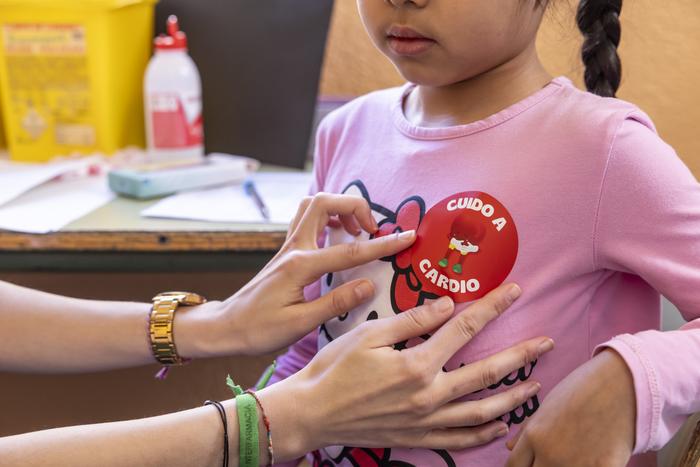A study led by the Centro Nacional de Investigaciones Cardiovasculares (CNIC) and Fundación SHE, supported by “la Caixa” Foundation, demonstrates that teaching healthy habits through classroom activities helps to prevent the accumulation of abdominal fat during the first school years.

Credit: CNIC
A study led by the Centro Nacional de Investigaciones Cardiovasculares (CNIC) and Fundación SHE, supported by “la Caixa” Foundation, demonstrates that teaching healthy habits through classroom activities helps to prevent the accumulation of abdominal fat during the first school years.
The study, published in the Journal of the American College of Cardiology (JACC), is one of the largest contemporary school-based health promotion studies and has one of the most extensive participant follow-up schedules.
The conclusions are clear: early intervention to promote healthy habits in elementary school children can be more effective than interventions at later stages.
The study included 1771 boys and girls attending 48 public elementary schools in the Comunidad de Madrid. The schools were divided into 4 groups. One group of 12 schools conducted a health-promotion intervention throughout the six years of elementary school; the intervention covered emotions management, acquisition of healthy eating habits, active living, and knowledge of the body and heart (SI! Program–Comprehensive Health). Another two groups conducted the same intervention but only for three years, one group during the first three years and the other group in the final three years. The forth group did not conduct any specific health-related intervention.
Throughout the study, a series of detailed measurements of cardiovascular health were obtained from the participants as they grew from 6 to 12 years old. The measures included markers of obesity and the accumulation of body fat.
The measurements were obtained at the start of the study, coinciding with the beginning of the first year of elementary school, and then at the end of the third and sixth school year.
The main results show that participants who were exposed to the intervention during the first three years of elementary school had less weight gain, smaller increases in body mass index, and markedly less accumulation of abdominal fat than participants in the other groups.
Excess weight affects almost 1 of every 3 children in Spain, especially those in more vulnerable social groups. “School is an ideal environment for the implementation of health-promotion programs. But while there have been many programs of this type, not many have been scientifically rigorous, and results have often been discouraging or inconclusive. But any intervention that improves children’s health will be beneficial if implemented on a large scale, especially given that this type of intervention has no secondary or adverse effects,” said Rodrigo Fernández-Jiménez, head of the Cardiovascular Health and Imaging laboratory at the CNIC and an author of the study.
“The results of this study suggest that interventions promoting healthy lifestyle habits can be more effective at reducing childhood obesity if implemented early, in the first years of elementary school,” said Gloria Santos-Beneit, Scientific Director of Fundación SHE and first author on the study.
“Building on our accumulated experience, this year we have launched a new study assessing the effectiveness of adaptations and extensions of the SI! Program strategy involving reintervention or the use of learning bites during the elementary school cycle. This approach could be even more effective because it places less demands on teachers, who are key figures in this type of school-based health-promotion intervention,” added Valentín Fuster, Director General of the CNIC and lead author on the study.
The CNIC is an affiliate center of the Carlos III Health Institute (ISCIII), an executive agency of the Spanish Ministry of Science, Innovation, and Universities. Directed by Dr. Valentín Fuster, the CNIC is dedicated to cardiovascular research and the translation of the knowledge gained into real benefits for patients. The CNIC has been recognized by the Spanish government as a Severo Ochoa center of excellence (award CEX2020-001041-S, funded by MICIN/AEI/10.13039/501100011033). The center is financed through a pioneering public-private partnership between the government (through the ISCIII) and the Pro-CNIC Foundation, which brings together 12 of the most important Spanish private companies.
Journal
Journal of the American College of Cardiology
Method of Research
Observational study
Subject of Research
People
Article Title
Effect of Time-Varying Exposure to School-Based Health Promotion on Adiposity in Childhood
Article Publication Date
29-Jul-2024



